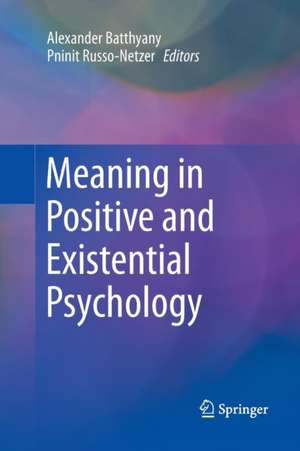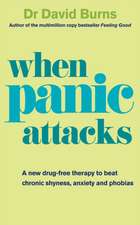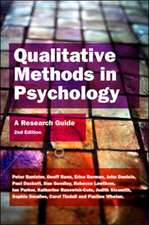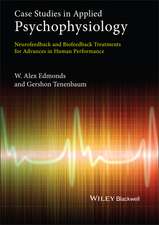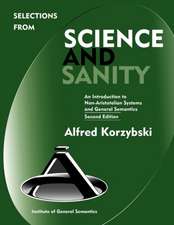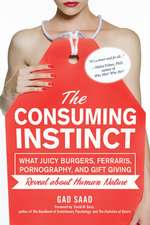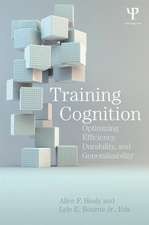Meaning in Positive and Existential Psychology
Editat de Alexander Batthyany, Pninit Russo-Netzeren Limba Engleză Paperback – 3 sep 2016
| Toate formatele și edițiile | Preț | Express |
|---|---|---|
| Paperback (1) | 1456.74 lei 6-8 săpt. | |
| Springer – 3 sep 2016 | 1456.74 lei 6-8 săpt. | |
| Hardback (1) | 1498.46 lei 6-8 săpt. | |
| Springer – 27 apr 2014 | 1498.46 lei 6-8 săpt. |
Preț: 1456.74 lei
Preț vechi: 1776.51 lei
-18% Nou
Puncte Express: 2185
Preț estimativ în valută:
278.77€ • 289.40$ • 232.46£
278.77€ • 289.40$ • 232.46£
Carte tipărită la comandă
Livrare economică 22 martie-05 aprilie
Preluare comenzi: 021 569.72.76
Specificații
ISBN-13: 9781493954544
ISBN-10: 1493954547
Pagini: 484
Ilustrații: XVII, 467 p. 8 illus.
Dimensiuni: 155 x 235 x 25 mm
Greutate: 7.31 kg
Ediția:Softcover reprint of the original 1st ed. 2014
Editura: Springer
Colecția Springer
Locul publicării:New York, NY, United States
ISBN-10: 1493954547
Pagini: 484
Ilustrații: XVII, 467 p. 8 illus.
Dimensiuni: 155 x 235 x 25 mm
Greutate: 7.31 kg
Ediția:Softcover reprint of the original 1st ed. 2014
Editura: Springer
Colecția Springer
Locul publicării:New York, NY, United States
Cuprins
Part I: Introduction.- Psychologies of meaning.- Part II: Conceptualizations of Meaning.- Meaning of Life: The Nature, Needs, and Myths.- Existential Mattering: Bringing Attention to a Neglected but Central Aspect of Meaning?.- Meaning as a Buffer for Existential Anxiety.- Meaning in Terror Management Theory.- Finding the Keys to Meaningful Happiness: Beyond Being Happy or Sad is Love.- Part III: A Dialogue Between Positive and Existential Psychology: Exploring Connections.- Extending the contexts of existence: benefits of meaning-guided living.- Ultimate Concerns from Existential and Positive Psychological Perspectives.- Narrative coherence and disruption: negotiating between positive and existential psychology.- Viktor Frankl’s Meaning-Seeking Model and Positive Psychology.- Positive Psychology, Existential Psychology, and the Presumption of Egoism.- Anxiety and the Approach of Idealistic Meaning.- Positive and Existential Psychological Approaches to the Experience of Meaning in Life.- Part IV: Empirical and Applied Perspectives.- Clinical Utilizations of Meanings.- Meaning in life and coping: Sense of meaning as a buffer against stress.- Perceived Meaning and Disaster Mental Health: A Role for Logotherapy in Clinical-Disaster Psychology.- Meaning Sensitive Psychotherapy: Binding Clinical, Existential, and Positive Psychological Perspectives.- Special Issues and Challenging Life Events.- Hardiness Leads to Meaningful Growth Through What is Learned when Resolving Stressful Circumstances.- Do Meaning in Life and Purpose in Life Protect Against Suicide Ideation among Community-Residing Older Adults?.- Mourning, Meaning and Memory: Individual, Communal and Cultural Narration of Grief.- Ebb and Flow in the Sense of Meaning Purpose: A Lifespan Perspective on Alcohol and Other Drug Involvement.- Well-Being and Personal Growth in Emerging Motherhood – And What about Meaning?.
Recenzii
“The essays in this intriguing and timely volume present a broad overview of contemporary theorizing and empirical work regarding meaning and purpose in life from two distinct intellectual perspectives: positive psychology and existential psychology. … Taken as a whole, this welcome work offers much that is of tangible benefit to the psychological theorist, researcher, and clinical practitioner, particularly those interested in broadening their conceptual and practical horizons in unexpected directions.” (Edwin E. Gantt, Journal of Theoretical and Philosophical Psychology, Vol. 36 (1), 2016)
"In this context, Meaning in Positive and Existential Psychology is valuable not only in content, but also a model for bringing together in dialogue and collaboration two schools of psychology that have a history of conflict. The contributors to this volume do not idealistically look to unify existential and positive psychology by oversimplifying or dodging the differences and debates; rather, they take seriously and honor differences in a constructive manner. The primary emphasis of the text is on what these two schools can learn from each other and how they can work together. Some chapters accomplish this better than others, as would be expected in a book with 21 chapters and over 400 pages. Yet, the overall tone of the book is one of collaboration and respect...Meaning in Positive and Existential Psychology will help bridge the divide and promote a more collaborative relationship. If the book does nothing more than accomplish this, it would be an extremely important contribution. However, the book has much more to offer. This volume is an important contribution and important read for anyone interested in existential psychology, positive psychology, and/or the study and application of meaning."
Louis HoffmanPsycCRITIQUES, December 22, 2014, Vol. 59, No. 51, Article 8
"In this context, Meaning in Positive and Existential Psychology is valuable not only in content, but also a model for bringing together in dialogue and collaboration two schools of psychology that have a history of conflict. The contributors to this volume do not idealistically look to unify existential and positive psychology by oversimplifying or dodging the differences and debates; rather, they take seriously and honor differences in a constructive manner. The primary emphasis of the text is on what these two schools can learn from each other and how they can work together. Some chapters accomplish this better than others, as would be expected in a book with 21 chapters and over 400 pages. Yet, the overall tone of the book is one of collaboration and respect...Meaning in Positive and Existential Psychology will help bridge the divide and promote a more collaborative relationship. If the book does nothing more than accomplish this, it would be an extremely important contribution. However, the book has much more to offer. This volume is an important contribution and important read for anyone interested in existential psychology, positive psychology, and/or the study and application of meaning."
Louis HoffmanPsycCRITIQUES, December 22, 2014, Vol. 59, No. 51, Article 8
Notă biografică
Alexander Batthyany holds the Viktor Frankl Chair for Philosophy and Psychology at the International Academy of Philosophy in the Principality of Liechtenstein. He teaches theory of Cognitive Science at Vienna University's Cognitive Science Program and Logotherapy and Existential Analysis at the Department of Psychiatry at Vienna Medical School. Since 2012, Batthyany is Visiting Professor for Existential Psychotherapy at the Moscow University Institute of Psychoanalysis. He is director of the Viktor Frankl Institute and the Viktor Frankl Archives in Vienna and first editor of the 14-volume Edition of the Collected Works of Viktor Frankl. Batthyany has published several books and articles and lectures widely on philosophical and existential psychology, philosophy of mind, and theory of cognitive science.
Pninit Russo-Netzer is a researcher at the Department of Counseling and Human Development at the University of Haifa. Her main research and practice interests focus upon Positive Psychology, meaning in life and Logotherapy, spirituality, change and development. Pninit has published several articles, developed programs and curricula for various organizations on these topics. Pninit lectures on positive psychology and related topics in a number of academic institutions and conducts workshops and training in organizations. She serves as academic advisor and consultant to both academic and non-academic institutions. She is a member of the International Positive Psychology Association and serves on board of directors of the Logotherapy Association in Israel.
Pninit Russo-Netzer is a researcher at the Department of Counseling and Human Development at the University of Haifa. Her main research and practice interests focus upon Positive Psychology, meaning in life and Logotherapy, spirituality, change and development. Pninit has published several articles, developed programs and curricula for various organizations on these topics. Pninit lectures on positive psychology and related topics in a number of academic institutions and conducts workshops and training in organizations. She serves as academic advisor and consultant to both academic and non-academic institutions. She is a member of the International Positive Psychology Association and serves on board of directors of the Logotherapy Association in Israel.
Textul de pe ultima copertă
"This volume, Meaning in Positive and Existential Psychology is a timely and engaging exploration of these contrasting, but potentially reconcilable, orientations. It raises questions that have wide ranging academic, clinical and personal significance… a volume such as this, written by some of the most influential figures in positive psychology, is very much welcomed. But it also gives equal voice to the existentialists and this is where the volume has a distinctive strength"
- From the Foreword by Professor Brian R. Little, Ph.D. C.Psychol. FBPsS, Distinguished Scholar, Department of Psychology and Fellow, Well-Being Institute, Cambridge University
Meaning in Positive and Existential Psychology presents a broad overview of contemporary empirical research and theoretical work on the meaning/purpose in life construct from two perspectives - Positive psychology and Existential psychology. Although they may have common ground, these perspectives have only recently come into fruitful dialogue. They may, in fact, be viewed as more complementary than strictly opposing. Positive psychology's focus on human strengths tends to emphasize the brighter side of human functioning, whereas existential psychology, traditionally, tends to address the more unsettling aspects of human existence, such as guilt, suffering, and mortality. Despite their different approaches, both positive and existential psychology have come to view meaning and meaning awareness as central psychological (and philosophical) factors, relevant both for human striving and for human coping.
Written by an international and interdisciplinary assembly of leading researchers in existential and positive psychology and related disciplines, this book includes twenty-one chapters on current trends and topics in meaning oriented clinical and theoretical psychology. Among the topics covered:
A dialogue between positive and existential psychology on:
- From the Foreword by Professor Brian R. Little, Ph.D. C.Psychol. FBPsS, Distinguished Scholar, Department of Psychology and Fellow, Well-Being Institute, Cambridge University
Meaning in Positive and Existential Psychology presents a broad overview of contemporary empirical research and theoretical work on the meaning/purpose in life construct from two perspectives - Positive psychology and Existential psychology. Although they may have common ground, these perspectives have only recently come into fruitful dialogue. They may, in fact, be viewed as more complementary than strictly opposing. Positive psychology's focus on human strengths tends to emphasize the brighter side of human functioning, whereas existential psychology, traditionally, tends to address the more unsettling aspects of human existence, such as guilt, suffering, and mortality. Despite their different approaches, both positive and existential psychology have come to view meaning and meaning awareness as central psychological (and philosophical) factors, relevant both for human striving and for human coping.
Written by an international and interdisciplinary assembly of leading researchers in existential and positive psychology and related disciplines, this book includes twenty-one chapters on current trends and topics in meaning oriented clinical and theoretical psychology. Among the topics covered:
A dialogue between positive and existential psychology on:
- Conceptualizations of meaning
- Clinical utilizations of meaning
- Meaning – Oriented
- Meaning and mortality
- Meaning and challenging life events
- Benefits of meaning-oriented living
- Meaning and existential anxiety
Caracteristici
Provides a unique opportunity for discussing important conceptual and empirical issues in both positive and existential psychology fields
Stimulates discourse, debate and dialogue on the question of meaning within the frameworks of positive and existential psychology
Presents state of the art research and theory of the current interdisciplinary discussion on meaning
Includes supplementary material: sn.pub/extras
Stimulates discourse, debate and dialogue on the question of meaning within the frameworks of positive and existential psychology
Presents state of the art research and theory of the current interdisciplinary discussion on meaning
Includes supplementary material: sn.pub/extras
